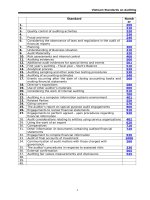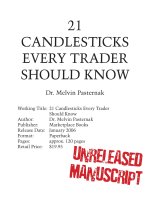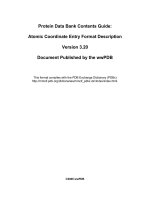Spartan Trader 123 setup version english Nikos Mermigas
Bạn đang xem bản rút gọn của tài liệu. Xem và tải ngay bản đầy đủ của tài liệu tại đây (5.01 MB, 110 trang )
CONTENTS
DEDICATION 3
ABOUT THE AUTHOR 4
THE
FX SYSTEM 7
THE 1-2-3 METHOD 10
EXERCISES E1-E2 13
SOLUTIONS E1-E2 15
THE HEIKIN-ASHI CANDLES 17
EXPONENTIAL MA CROSSOVER 18
THE EMA CROSSOVER SYSTEM
AND FX CRITERIA RULES 23
HOW AND WERE EXACTLY DO WE EXECUTE A TRADE 24
MONEY MANAGEMENT RULES 26
LONG POSITION AND
TRADE MANAGEMENT RULES 28
SHORT POSITION AND TRADE MANAGEMENT RULES 29
FX PC SCREEN SETUP & TRADING APPROACH 31
FX TRADING EXERCISES (WORKBOOK) 36-95
A TRADING ADVISOR, COACH OR MENTOR 96
A PERSONAL MESSAGE 98
NOTES 99-109
2
DEDICATION
I AM DEDICATING THIS BOOK TO MY WIFE, MY
SON, MY PARENTS, MY SISTER, MY FRIENDS, AND
TO ALL THE READERS FOR THEIR PASSION TO
ACHIEVE TRADING MASTERY.
3
ABOUT THE AUTHOR
Dear Reader!
My name is Nikos Mermigas. I was born and raised in Germany. I came to
Greece in 1993 when I was 21 years old. My job as a musician and music teacher
forced me to travel a lot and kept me frequently away from my home and family.
A good friend and I decided on a quest to find something that would untie our
hands a bit, something that would provide us with more time to spend with our
family and have extra money. So our search began! We searched for a way to be
our own bosses and a way to work from home using a computer. We searched
many months and were flooded with worthless information and ideas. We
couldn’t find anything that we desired.
At that time I had some stocks which I was not trading on my own. From time to
time I would look to see how they were performing. After a conversation with a
stock broker we learned about the foreign exchange (forex) market. We had never
heard about the foreign exchange market before and were now curious. Finally we
found something we wanted to learn more about!
We learned that forex could indeed be a small, personal business that anybody
could manage from anywhere in the world with only a computer and an internet
connection. That sounded great and our hope intensified! We also learned
thousands of people are making money from their home sitting on their couch or
in their home office, and some of them had quit their full time jobs or were just
making an extra income from trading in the forex market.
For me personally, it was love at first sight!
I realized there was tremendous potential in the forex market and I started
trading forex with confidence. I opened a small account and started to buy and sell
currencies without knowing the basic rules of trading and without any knowledge
on this subject. In less than six months my friend and I lost almost all the money in
our account.
But why did we lose? Very simple! We did not trade at all. We were just gambling
like 90% of traders do.
At that point I needed a one month break to put my thoughts in order. I asked
myself a lot of questions. There were nights I couldn’t sleep because of so many
questions and thoughts flying around in my mind! What did I do wrong? What
are successful traders doing differently than me? How can I improve? How can I
succeed on a long term basis and how can I handle my emotions like greed and
fear during my trading?
4
After a while I sat down and said to myself;; every career, every job and every
business needs proper training. It is no different at all in trading the forex market
and why should it be?
I started reading lots of books (most of them did not help me at all to improve my
trading). I also went to trading psychology and technical analysis seminars. I took
all the useful information from these webinars and seminars to help me create my
own trading rules and my own trading system. It took me a while but when I
really started following my system rules, with patience and discipline, things
started to turn around in my favour. I believed in myself and my rules. When I
doubled my account I knew I had succeeded!
A person may not need a lot of coaching to become a real trader, but without the
right training I think most people are doomed to fail.
Looking back, I now see that trading is not hard to learn at all. It truly can be very
easy. We humans have the tendency to complicate things without having a real
reason to do so. That, in my opinion is why 90% of people loose in the forex
market.
The biggest advantage about the
FX ( FX) system is that you
can use it successfully in each and every market, not just the forex market. The chart
reflects every human emotion and so the signals are the same. In our case it does
not matter if we are talking about the forex market or any other financial market.
Today, I am a full time trader. My favourite market is still the fast moving forex
market. I love to do my chart analysis in the morning and then execute my trades
when I get the signal as per my system rules. Life as a trader gives me great
pleasure. I have goals, I have reasons to think positive, and I am always
confronted with new challenges and opportunities day after day and week after
week.
I have met a lot of traders and 80-90% of them have not made money consistently
over the long term. In fact they have lost it consistently. I thought this was really
interesting. Most of these guys were experienced traders with knowledge and
passion for trading. Their problem was not necessarily their trading system. They
just couldn’t follow their rules because they did not believe in what they were
doing. Some had no discipline, some had too much fear, and some were unable to
pull the trigger. Their mental state was in bad condition and they looked for
excuses why things did not work out.
Later on I accidentally started to teach my system to an experienced but
unsuccessful trader through the internet. We took live trades together and I tried
to help him gain his confidence back. With a little work from both of us, he finally
made it!
5
It was exhilarating helping someone stand on his own two feet again. The feeling
was so great it is difficult to describe. That trader asked me if I would help some of
his friends with their trading. I started coaching those traders and one thing led
to another and hence forth I started with the
FX LIVE TRADING
courses.
FX was born!!!!
Trading took on new meaning for me. Now, not only do I enjoy trading but also
enjoy helping others overcome their obstacles and traps which are hindering them
from becoming successful in their trading.
I wish you
Health, happiness and success
Nikos Mermigas
6
ΤHE
SYSTEM
I welcome you to the
have decided
FX team and I am happy that you
7
Before we start, I would like to make it clear that the
FX system
its trading philosophy are based on 100% technical analysis. As you might know
already, the computer and the internet is a must for the modern Trader. The
trader is able to manage his trades easily while watching the charts and indicators
on his screen. With a simple mouse click he/she is able to open and close positions
from any place in the world.
For you to use the
FX system correctly you only need a few simple
technical indicators.
The most important thing is that you should learn to read charts, see the setups
and take the action when required according to the
FX system.
You don’t need to understand how exactly the indicator works to be successful in
your trading. The only thing you need to know is how to use them correctly to
make your daily pips.
Let’s take an example of a TV. Most people don’t even know what a TV looks like
on the inside or how it works but that does not mean that they can’t watch their
favourite programs.
We only need to switch the right buttons to watch what we would like, right!?
In the same way we don’t need to know how an indicator works but instead we
only need to know how to use them.
It sounds easy and I am not kidding when I say that it really is! In trading you
have to control your emotions and just follow the rules of your system, otherwise
you will be in trouble.
I won’t go much through the trading-psychology here, because that is not the
point of this particular E-book.
It is important you always remind yourself to be disciplined and follow exactly the
rules of the
FX system to make it work.
If you do that then, I promise, you will have 70-80% winning trades over the
medium to long term.
Of course when it comes to money, controlling your emotion is not always that
easy but with practice, willpower and positive psychology you will achieve mastery
for sure.
Always remember that a real trader is open-minded and his focus is on his profits,
success and right money management and not on his losses.
The system is very easy to understand and after you have read this e-book I will
help you at your request and will show you for free many examples in a live-
trading session so that you can get more confident with my system.
8
On the following 100 pages I will guide you step by step through the
FX system. When I was learning about forex I spent countless hours in front of my
pc, fine tuning my system. I desperately wanted to make this work! I remember
having difficult and often torturous times before I made it, but I persisted and
therefore, I was rewarded.
The basic philosophy and goal of my system was and is, to cut my losses and let the
winners run. With the FX you will learn in a very pleasant way, how to use my
techniques and to trade successfully without going through all the trouble I
experienced in the past. You will find enough space in this book to make notes and
write down your thoughts.
Just keep it simple and you will succeed.
Have fun and enjoy!
9
THE 1-2-3 METHOD
THE 1-2-3 method has existed in technical analysis for quite some time, but
unfortunately many traders don’t know how to use it the right way. The
system is based on this technique, but only in combination with 2
other indicators.
This combination is the key to getting outstanding results in trading. If you use it
correctly!
You will be able to pick up the bottoms and tops and ride the market trends on
any timeframe, if you will follow the rules of the system 100%.
So, what other indicators do we need to approach trading according to the FX
system?
A) HEIKIN ASHI CANDLES
B) EXPONENTIAL MOVING AVERAGE CROSSOVERS
After analysing our trades with these indicators, we look at a NEWS CALENDAR
to make sure that we don’t execute a trade close to an important political or
economic announcement.
You must be thinking at this time that it is too simple to be true, but believe me it
really is! You just have to get used to it and practice it as often as you can until
this strategy becomes a habit.
After understanding the basics you must believe in yourself and always focus on
your success and nothing else.
I highly recommend that you first use a Demo-account and only start trading real
money after you perfectly understand the system and double the money on your
practice (demo) account.
Don’t trade if you are tired or in bad psychological condition.
Before you turn on your PC you have to make sure that you are focused and your
mindset is on the right frequency for trading.
You should always know that small losses are part of the game, and that should
never interfere with your decisions when good signals come up.
Don’t waste your thought on fear and greed. Just try to focus on the system rules.
Do that day by day and you will see how easy trading can be in the end.
Let’s start with the basics…
10
How do we indentify and use the 1-2-3 method the right way!
You surely have noticed that price never really moves in a straight line during a
trend.
Price will take a breather and retrace often before it reaches a top on an up trend
or a bottom on a down trend.
The first sign of a trend change appears when the market creates a lower low (2)
and a lower high (3), after a previous high (1) in an uptrend;; or a higher high (2),
and a higher low (3), after a previous low (1) in a down trend.
N1
11
In the next example (N2) and with the help of the Trend lines you will see how
easily you can locate the 1-2-3 setups on the charts.
1. You have to find and connect the lowest points in an uptrend, searching for at
least 3 touches (red line). Price follows the trend line to the upside.
2. Now connect the lowest point (1) with the following high (2) and this again with
the next low (3).
There is your first and OBVIOUS 1-2-3 to the upside.
This was easy I guess.
Price continues its move to the upside creating another bullish 1-2-3 after a while.
This is a confirmation that the uptrend is still on.
A new high is following, but the price does not show us its intentions clearly.
As you can see now, the candles are failing to bounce on the uptrend line and that
means that the buyers are slowly loosing their power.
What is happening now?
For the first time and after the highest point (1), you can see a lower low (2) and a
lower high (3).
What else do you see?
The uptrend line has broken too. This bearish 1-2-3 after the uptrend is our first
sign and warning.
As you can see now, more bearish 1-2-3s are following and the trend has now
clearly changed to the downside (blue line).
N2
12
EXERCISE
E1 & E2
Please take a pencil and a ruler to draw the trend lines and the 123 setups on the
charts.
Further try to spot the trend changes on both examples.
Look for help from the previous chart example (N4).
If you like to take notes feel free to do so. You will find enough space on the next
page.
E1
13
E2
NOTES E1:
NOTES E 2:
14
SOLUTIONS FOR E1 & E2
E1S.
The bullish 1-2-3 at the left bottom on this chart is the first sign for a bullish trend.
Point 3 is higher than point 1, so the price has created a higher low.
Now connect all the higher lows and you will find you have drawn the uptrend line
(red line).
After that, higher highs and higher lows are following. You can easily spot the
following bullish 1-2-3s (blue lines).
The support is strong because as can you see, the price always bounces after a
touch with this trend line.
After seven bullish 1-2-3s the buyers start to loose their power and the market is
not able to create a new high 1.
The trend line is breaking for the first time. Now you can see a lower low 2 and a
lower high 3. The support line has become a resistance line now. The first sign for
a downtrend is given here.
15
E2S.
The bearish 1-2-3 at the left top on this chart is the first sign for a bearish trend.
Point 3 is lower than point 1, so the price has created a lower high.
Now connect all the lower highs you can find to draw the downtrend line (red
line).
After that, lower highs and lower lows are following. You can easily spot the
following bearish 1-2-3s (black lines).
The resistance is strong, because as can you see, the price always bounces off the
trend line.
After eight bearish 1-2-3s the sellers start to loose their power and the market is
not able to create a lower low (after point 1).
The trend line is breaking to the upside. Now, for the first time you can spot a
higher high 2 and a higher low 3. Now the resistance line has become a support
line. The first sign for an uptrend is given here.
ALWAYS REMEMBER:
WE NEED TO FIND AT LEAST 3 TOUCHES TO CREATE A TREND LINE
16
THE HEIKIN-ASHI CANDLES
We are using the Heikin-Ashi candles charts instead of regular candlesticks
charts. The Heikin-Ashi chart looks almost like the candlestick chart but the
method of calculating the candles on the Heikin-Ashi chart is different. You can
find Heikin Ashi candles on most of the trading software platforms.
With candlestick charts, each candlestick shows four different prices: Open,
Close, High and Low price. Each candlestick is independent and has no relation
with the previous candlestick. Heikin-Ashi candles are different. Here the candles
are calculated and plotted using information from the previous candle. The price
movement looks very smooth on the chart and the 1-2-3 setups are more easily
spotted. We will also be able to avoid bad trades and identify trend changes
faster using these candles the right way. Later on in this e-book, I will explain in
detail how we do that.
N3
17
EXPONENTIAL MOVING AVERAGE (EMA) CROSSOVER
Moving average (MA) is one of the most popular and easiest to use indicator for
the technical analyst. They smooth out price action and therefore it makes it easier
to spot a trend. This is very helpful in volatile and trending markets.
The market consists of huge crowds and the moving average identifies the
direction of mass Movement.
Of course all moving averages are lagging indicators and will always be behind
price. The moving average works great in trending markets and currencies trend
very well, so they fit great with trend following indicators.
When there is no trend the MA will give many false signals and that is the reason,
why we always need a combination of indicators to make the trading system work.
EMA gives greater weight to the latest data and responds to changes faster than a
simple MA. Moving averages will help us to trade and to stay in the direction of
the trend as long as possible.
This makes the EMA a very important tool to the
FX system.
The EMA’s that we need and the reasons we use them are the following…
• EMA 200 on all timeframes, to locate and watch
market trends and for support and resistance levels.
• EMA 633 for support and resistance levels on all time
frames.
• EMA 12/EMA 36 crossover on all timeframes to
define trading entries/exits, to locate trends and to
manage trades at support/resistance levels.
18
N4
On the chart (N4) you can see the nice downtrend using Heikin-Ashi candles.
Now take a look at the EMA’s.
All four are above the price. It looks like the EMA 36 is pushing the price to the
downside.
During a trend, the EMA 36 is our most important resistance/support level.
If the price breaks the EMA 36 and a 1-2-3 setup forms after that, then there is a
good possibility for a trend change.
Now that you understand the basics let’s start with the EMA 200.
As a general rule we can say, if price moves under the EMA 200 we are looking for
shorts, and if it goes above the EMA 200 we are looking for long trades.
Knowing this of course is not enough but at least you get the direction of the trend
and know what to look for.
Many times you will get a signal not even close to the EMA 200. Keeping in mind
this general rule of 200 EMA will help, so you are able to make your decisions
much faster.
The following example (N5) should help you understand.
After you have studied the chart two more exercises (E3/E4) will follow.
Like before feel free to use a pencil and a ruler to draw your trend lines and 1-2-3
setups. Only after you finished drawing the trend lines and 1-2-3 setups then
check the solutions.
19
N5
The price is bouncing on the EMA 200. As you can see at the blue arrows long trades are in play. The support line is holding
at first so there is no sign for a short trade. After the trend line break and the break of the EMA 200 you can spot the bearish
1-2-3. The price is not able to pass the EMA 200 to the upside again. After the 1-2-3 setup, the 2 to 3 line breaks (blue circle)
and shorts are in play now.
20
Exercise E 3
21
Solution E3S.
22
THE EMA CROSSOVER SYSTEM
AND FX CRITERIA RULES
Now that you understand the use of the EMA 200, we can go on with the crossover
of EMA 12 and EMA 36.
The EMA’s and the EMA crossover system will be used in combination with the
1-2-3 method.
With this, you will learn were to enter a trade and how to manage the trade when
the trend is changing its direction.
You can use this method on anytime frame and later on I will explain to you, how
to approach a trade, no matter if you want to scalp or swing the market.
It is very important that you always remember and follow the rules of the FX
system before you take any action.
Confirmation for a long entry
(BUY ORDER)
1. Do we have an EMA 12/36 crossover to the upside?
2. Do we have a support at the price level?
3. Do we have a break of resistance level(s)?
4. Do we have a point 2-3 break to the upside after the 1-2-3 setup?
Confirmation for a short entry
(SELL ORDER)
1. Do we have an EMA 12/36 crossover to the downside?
2. Do we have a resistance at the price level?
3. Do we have a break of support level(s)?
4. Do we have a point 2-3 break to the downside after the 1-2-3 setup?
Only if you answer yes on all four rules, you should take action and
execute the trade
23
HOW AND WHERE EXACTLY DO WE EXECUTE A TRADE?
On the following chart you can see the execution of a short trade (eur/usd) using
the one minute chart for an early entry.
N6
Let us analyze this short trade now!
Imagine you are sitting in front of this particular chart trying to spot a trade.
So how do you start?
First you have to focus and remind yourself of the four rules you have to follow,
before you take any action.
At the upper left side you can see that the price has stopped its move to the upside
(1). After the down crossover of the EMA 12/36 the candles break the EMA 200
support quite fast, creating a lower low on the chart (2).
Then the price was able to retrace back to the EMA 200 level again (3), were it
found resistance now, creating a nice 1-2-3 setup.
Please make sure that point 3 is always lower than point 1, when we are talking
about a bearish 1-2-3 setup and higher than point one, when we are talking about
a bullish 1-2-3 setup. After the down break of the 2-3 line (look at the red arrow)
you have to take action and execute your short trade.
It is important that you enter at the right level to get the best price possible,
especially when you are scalping the market.
Look at the 2-3 break again. Notice the first red candle after the break.
You can see a big candle body with a small lower shadow exactly on the EMA
200/36 and 12 (in the black rectangle). It is important that the body of this red
candle closes at least 50% under the EMA 12 (over the EMA 12 for longs) to alert
you. Then you wait for the price to move a couple of pips under the previous
candle and off you go. You enter the trade exactly at this level.
24
N7
At the lower left side you can see that the price has stopped its move to the
downside.
At first you can see that the price is able to break the resistance line on the chart.
After the cross up of EMA 12/36 (1) the candles break the EMA 200 resistance too,
creating a higher high (2) and a higher low(3) on the chart.
Then the price was able to find support at the EMA 200 level.
You should easily spot the 1-2-3 setup now.
Please make sure that point 3 is higher than point 1, when we are talking about a
bullish 1-2-3 setup. After the up break of the 2-3 line, (look at the blue arrow) you
have to take action and execute your long trade.
Again look at the 2-3 break. Notice the first green candle after the break.
You can see a nice candle body with a small upper shadow exactly on the EMA 12
(in the black rectangle). It is important that the body of this green candle closes at
least 50% over the EMA 12 to alert you. Then you wait for the price to move a
couple of pips higher than the previous candle and there you are again. You enter
the trade exactly at this level.
Please remember that patience is the key here. Many traders don’t wait for a
retracement. It is very important to give the market time to breathe and execute
your positions at the right spot.
The first reason to do so is that you will have a low risk and high probability
trade.
Secondly, you normally get a much better entry price and the third reason is that
you will be able to place your stops at the best price.
25









